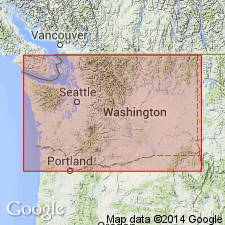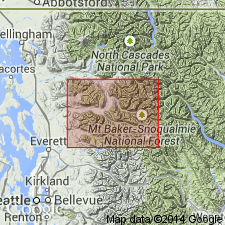
- Usage in publication:
-
- Magic Mountain gneiss
- Modifications:
-
- Named
- Dominant lithology:
-
- Gneiss
- Schist
- AAPG geologic province:
-
- Cascades province
Summary:
Area south of Cascade Pass, Northern Cascade Mountains, WA, consists of three structural belts. Rocks of central belt include Cascade River schist (new), LeConte gneiss (new), Magic Mountain gneiss (new) and Spider Mountain schist (new). Magic Mountain gneiss, strongly tectonized, consists of interlayered epidote-albite gneiss and epidote-albite chlorite schist. Grades into LeConte gneiss. Overlies progressively metamorphosed Cascade River schist. Underlies Spider Mountain schist. Cascade River schist and overlying plate of Magic Mountain gneiss and Spider Mountain schist have been folded into major southeast-plunging synclines and anticlines. [age not stated]
Source: GNU records (USGS DDS-6; Menlo GNULEX).

- Usage in publication:
-
- Magic Mountain Gneiss*
- Modifications:
-
- Adopted
- AAPG geologic province:
-
- Cascades province
Summary:
Magic Mountain Gneiss of Tabor (1962) is adopted. Unit is named for Magic Mountain, Cascade River 7.5' quad, Skagit Co., WA. Consists of chlorite-muscovite-epidote-quartz gneiss and flaser gneiss, mafic greenschist, and chlorite schist. Structurally overlies the Cascade River Schist [conformably] overlain by schist, called the Spider Mountain Schist by Tabor (1961, 1962), which is here included in the Cascade River Schist. Protolith age is Late Triassic (U/Pb=195-210 Ma); metamorphic age is presumably Late Cretaceous to middle Eocene.
Source: GNU records (USGS DDS-6; Menlo GNULEX).
For more information, please contact Nancy Stamm, Geologic Names Committee Secretary.
Asterisk (*) indicates published by U.S. Geological Survey authors.
"No current usage" (†) implies that a name has been abandoned or has fallen into disuse. Former usage and, if known, replacement name given in parentheses ( ).
Slash (/) indicates name conflicts with nomenclatural guidelines (CSN, 1933; ACSN, 1961, 1970; NACSN, 1983, 2005, 2021). May be explained within brackets ([ ]).

